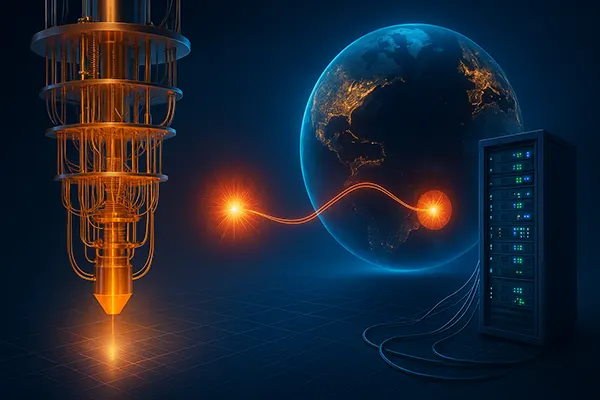Quantum Communication: How Close Are We to an ‘Unbreakable’ Internet?

For decades, cybersecurity has relied on mathematical encryption that assumes certain problems are too complex for computers to solve. However, the rapid progress of quantum technologies is challenging this foundation. Quantum communication — a new frontier built on the principles of quantum physics — promises data transmission that is theoretically immune to hacking. But how close are we really to achieving a truly “unbreakable” Internet in 2025?
The Science Behind Quantum Communication
Quantum communication is based on the fundamental behaviour of particles at the quantum level, particularly the phenomena of superposition and entanglement. These effects enable information to be encoded into quantum bits (qubits), which can exist in multiple states simultaneously. This makes it possible to create encryption keys that are unique and instantly detectable if tampered with.
The most common protocol, known as Quantum Key Distribution (QKD), allows two users to share a secret key that cannot be intercepted without detection. If an eavesdropper attempts to access the quantum channel, the act of observation changes the quantum state, alerting the communicating parties immediately. This principle, grounded in the laws of physics rather than mathematical complexity, makes QKD fundamentally different from classical encryption.
Recent developments have made QKD practical over optical fibres and even between satellites. China’s Micius satellite and the European Quantum Communication Infrastructure (EuroQCI) have demonstrated secure quantum links spanning hundreds of kilometres, showing that global quantum networks are no longer just theoretical.
Real-World Applications Emerging in 2025
As of 2025, governments and corporations are investing heavily in quantum communication systems. The European Union’s EuroQCI initiative aims to link all member states with secure quantum channels by 2027, while the United States’ Department of Energy is developing its own Quantum Internet Blueprint. These efforts underline the strategic importance of quantum networks for national security, defence, and financial infrastructure.
Telecommunications giants such as BT, Toshiba, and SK Telecom are testing hybrid networks that combine classical and quantum encryption. In the banking sector, experiments by JPMorgan Chase and HSBC are exploring how QKD can safeguard high-value transactions and inter-bank communications. Even cloud service providers are experimenting with quantum-safe data transmission to prepare for a post-quantum world.
Beyond security, quantum communication could also improve synchronisation between quantum computers and enable distributed quantum computing — a step that would accelerate both scientific and technological progress.
The Challenges Ahead
Despite these advances, quantum communication still faces significant technical and economic barriers. The hardware required for stable qubit generation, transmission, and detection is expensive and highly sensitive to environmental factors such as temperature and vibration. Maintaining entanglement over long distances remains one of the greatest challenges to creating scalable quantum networks.
Another major hurdle is the integration of quantum and classical systems. The world’s digital infrastructure is deeply rooted in classical computing and networking, and retrofitting it for quantum compatibility demands extensive research and standardisation. Without global protocols, interoperability between different quantum networks could become a major obstacle.
Furthermore, quantum repeaters — devices needed to extend the range of quantum signals — are still in early development. Current optical fibres can only carry quantum data reliably over around 100–200 kilometres without signal degradation. Overcoming this limitation will be crucial for building a truly global network.
Ethical and Strategic Considerations
Quantum communication raises profound geopolitical and ethical questions. The nations that achieve secure quantum networks first could gain unprecedented control over global data flows. This technological race has already begun, with China, the EU, and the United States investing billions in quantum research.
Another concern is accessibility. If only wealthy nations or corporations can afford quantum-secure systems, it could widen the digital divide and create new inequalities in global information security. International cooperation will be essential to ensure that quantum communication benefits all societies, not just the technologically advanced.
There are also privacy implications. While quantum communication enhances security, it could also enable untraceable communication channels, complicating efforts to prevent cybercrime and terrorism. Policymakers must balance privacy with accountability as this technology matures.

What the Future Holds
By 2025, quantum communication has moved from laboratory curiosity to emerging infrastructure. Pilot projects across Europe, Asia, and North America demonstrate that secure quantum links are not only possible but increasingly practical. However, achieving a fully quantum Internet — one that connects users globally through entanglement — is still at least a decade away.
Experts predict that the next major step will be the development of functional quantum repeaters and the expansion of satellite-based quantum networks. These innovations will allow secure communication between continents, paving the way for a hybrid Internet combining quantum and classical systems.
Ultimately, the concept of an “unbreakable” Internet may remain idealistic, but quantum communication brings us closer to a future where security is guaranteed by the laws of nature themselves. As global initiatives accelerate, the dream of truly secure information exchange is rapidly becoming a reality.
The Road to a Quantum Internet
For quantum communication to evolve into a global Internet, collaboration between academia, industry, and government is essential. Universities such as MIT, the University of Vienna, and the University of Science and Technology of China are leading research on quantum repeaters, photon entanglement, and integrated quantum chips.
Private companies are focusing on commercialisation — from Toshiba’s quantum-safe communication modules to ID Quantique’s cryptographic devices already used in Swiss and Japanese financial sectors. These practical deployments are critical in demonstrating the real-world value of quantum security.
While challenges remain, the direction is clear: within the next decade, quantum communication will redefine how humanity protects, transmits, and trusts digital information. The “unbreakable” Internet is not science fiction — it is the next logical step in the evolution of global connectivity.
